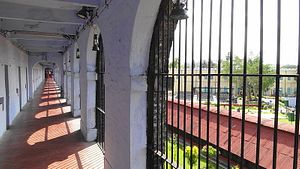On October 31, eight arrested members of the Students’ Islamic Movement of India (SIMI) broke out of the Bhopal Central Jail in the Indian state of Madhya Pradesh after killing the security guard. Within hours, they had been caught by the police and killed when they attempted to challenge their arrest. The story of the so-called “SIMI encounter” quickly spread while the Madhya Pradesh government came out in support of the police – lauding their efforts in a situation where they supposedly had no choice but to respond the way they did.
State Home Minister Bhupendra Singh went on to say that the speed and intensity of this reaction were necessary to “foil a possible terrorist threat.” In the days since, however, holes have emerged in the story that warrant questioning – from the politics of terming the suspects “terrorists,” to the circumstances of encounters like this one following a jailbreak.
The SIMI was banned in 2001 by the government and several members of the organization have been apprehended by the police over different incidents during the 15 years since. In fact, this is the second major SIMI jailbreak to happen in the past three years – the first being in 2013, when seven men escaped from jail in Madhya Pradesh’s Khandwa district. Three of those men were also part of the SIMI encounter in Bhopal that ended in their death. In the three years it took to arrest them, they have been accused of inspiring instances of terror in at least six other states while in hiding.
The Madhya Pradesh police have said that the suspects died in retaliatory firing. They claim that the eight had been consistent perpetrators of serious offenses, which even resulted in the killing of police constables in 2008 and 2011. When their jailbreak was discovered, resources were garnered and search and patrol parties were formed. It was difficult to locate them over rough terrain, but when they were finally tracked down with the help of locals, the suspects were armed. They died therefore in a crossfire, the police department explains.
However, in a video of the encounter that was been shot on cellphones and has been circulating since, some inconsistencies in the official account begin to emerge. The video shows the cops opening fire at a very close range, when one of the suspects appears to pull out a weapon that looks like a knife. The post mortem report also indicates that the attackers died of gunshot wounds mainly above the waist – indicating that attempts at bodily harm made by the police seem to only have been aimed at the stomach and above.
While locally made knives and pistols were recovered from the bodies after the encounter, eyewitness accounts indicate that the suspects had hurled stones at those who attempted to arrest them and not bullets, as the inspector general indicated when he spoke of crossfire. Bhupendra Singh’s own statement seems to fluctuate as, at one instance, he spoke of plates and spoons stolen from the prison being thrown by the suspects.
While the video is as yet unverified, the details surrounding the story begin to be less clear-cut in the wake of all this fluctuation. Questions into the manner of the escape are also being raised, as officials in the prison face suspension. How did an event of this proportion occur in a high security prison? It is also unnerving that not one of the suspects was brought back alive to probe the issue.
While Chief Minister Shivraj Singh Chauhan congratulated the security forces, ex-Chief Minister Digvijay Singh wondered aloud whether this was a conspiracy in which the police forces were complicit. He is not alone in this. In the days since, the Aam Aadmi Party, the Congress, and the Communist Party of India-Marxist have all expressed a desire for a judicial probe into the circumstances surrounding the encounter.
Moreover, several leading Muslim clerics within the state have converged on the strand that this whole incident appears suspicious. A joint statement by clerics requesting a probe has joined other calls. The Ulema in the state, who rarely take a stance on such allegations, said that it was wrong and illegal to presume guilt and declare the escapees terrorists, alluding to the state and police forces’ constant attempts to portray the suspects as cold-blooded killers.
West Bengal Chief Minister Mamata Banerjee has said that she does not believe in this encounter theory and hints at a possible political vendetta being the context to the case – pointing to the number of questions that lie on flimsy ground. Bahujan Samaj Party chief Mayavati has also made a statement that the suspects could have been caught alive and she accuses the BJP of furthering their and the RSS’s agendas for nefarious political purposes. Former Supreme Court judge and Delhi High Court Chief Justice Markandey Katju has also said that this so-called encounter appears fake, and termed it an “extra-judicial killing.” Family members of one of the victims have also said that the victim, Abdul Majeed, had received threats that he would be killed in a fake encounter from the police.
Almost all the above individuals have vested interests in taking the stances they did – both lauding and condemning the encounter. But the barrage of confusing and sometimes contradictory statements leaves us with no clear narrative of the incident. At this point, a court-sanctioned judicial probe is the need of the hour, to ensure that political leanings do not continue to mar the investigation.

































